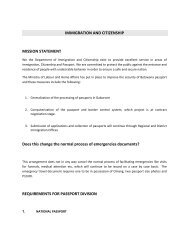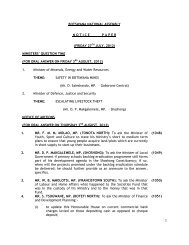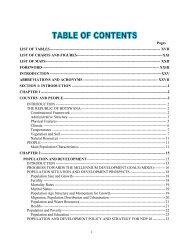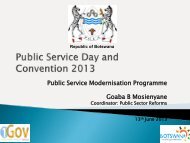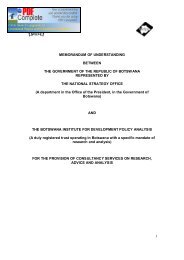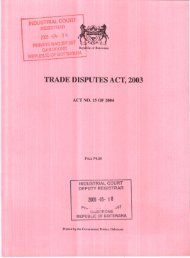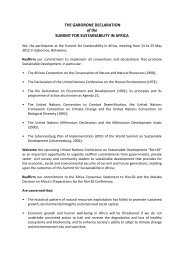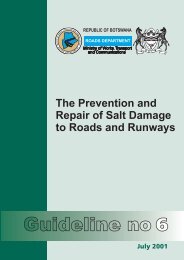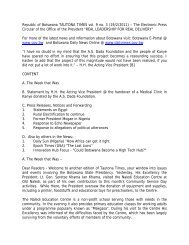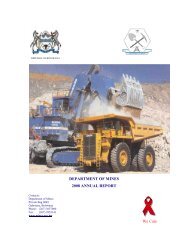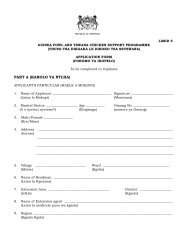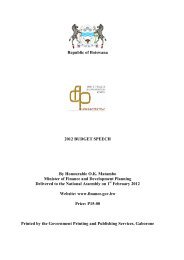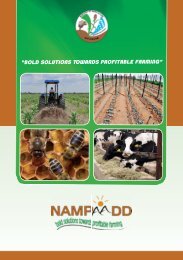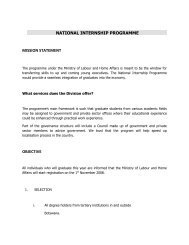National Nutrition and HIV/AIDS Guidelines for Service Providers of ...
National Nutrition and HIV/AIDS Guidelines for Service Providers of ...
National Nutrition and HIV/AIDS Guidelines for Service Providers of ...
You also want an ePaper? Increase the reach of your titles
YUMPU automatically turns print PDFs into web optimized ePapers that Google loves.
8.5 Hygiene in the Kitchen<br />
° Keep all food preparation surfaces clean.<br />
° Use clean dishes <strong>and</strong> utensils to store, prepare, serve <strong>and</strong> eat food.<br />
° Cover food to prevent both flies <strong>and</strong> dust from contaminating the food.<br />
° Keep garbage in a covered bin (<strong>and</strong> empty it regularly) so it will not cause <strong>of</strong>fensive smells <strong>and</strong><br />
attract flies, which can contaminate food with germs.<br />
° Kitchen utensils should not be stored on the ground where they can be contaminated with<br />
disease causing organisms. Instead they should be placed on a raised plat<strong>for</strong>m, where there is<br />
sunlight <strong>and</strong> enough air circulation.<br />
° Cleanliness is vital to food safety. Refrigerators should be defrosted <strong>and</strong> cleaned thoroughly<br />
<strong>and</strong> regularly.<br />
° Dish towels should be washed <strong>and</strong> boiled <strong>of</strong>ten to kill germs<br />
° The use <strong>of</strong> dish towels to wipe h<strong>and</strong>s after washing them should be discouraged because dish<br />
towels can spread germs<br />
8.6 H<strong>and</strong>ling, Cooking <strong>and</strong> Storage <strong>of</strong> Food<br />
° Wash vegetables <strong>and</strong> fruit with clean water. If it is not possible to wash fruits <strong>and</strong> vegetables<br />
properly, remove the skin be<strong>for</strong>e eating to avoid contamination. Cut-<strong>of</strong>f the bruised parts <strong>of</strong><br />
fruits <strong>and</strong> vegetables to remove any moulds <strong>and</strong> bacteria growing there.<br />
° Throw away foods that have gone bad or well past the “sell-by” or expiration date.<br />
° Wash utensils <strong>and</strong> surfaces touched by animal products with hot water <strong>and</strong> soap be<strong>for</strong>e<br />
preparing other foods such as raw salads.<br />
° Wooden boards should not be used <strong>for</strong> cutting animal products. Plastic cutting boards are<br />
better.<br />
° Keep meat <strong>and</strong> fish separate from other foods.<br />
° Food from dented or bulging cans should not be consumed; once a can has been opened, the<br />
food should be removed from the original can <strong>and</strong> kept in a clean non-metallic container.<br />
Use clean cups <strong>and</strong> spoons to feed infants.<br />
When cooking food:<br />
° Cook food on a high heat to kill most germs <strong>and</strong> eat it as soon as possible after cooking.<br />
° Do not overcook vegetables as vitamins <strong>and</strong> minerals will be lost.<br />
° Cook meat <strong>and</strong> fish well, until there are no red juices.<br />
° Boil eggs until hard <strong>and</strong> avoid using cracked eggs; do not eat s<strong>of</strong>t-boiled eggs, raw eggs or any<br />
food containing raw eggs.<br />
For proper food storage:<br />
° Store cooked <strong>and</strong> fresh food in a cool place or refrigerator where available, because germs<br />
multiply more quickly in warm food.<br />
° Store raw <strong>and</strong> cooked foods separately; use containers to avoid contact between them.<br />
° Do not store foods <strong>for</strong> long periods in the refrigerator.<br />
° Where there is no refrigerator, fresh products such as meat, chicken or fish should be<br />
36



